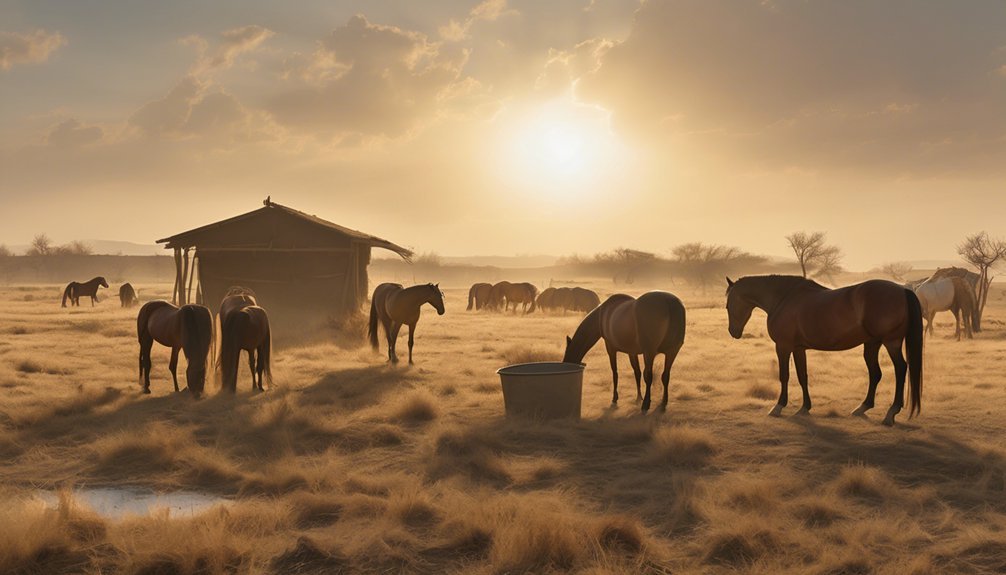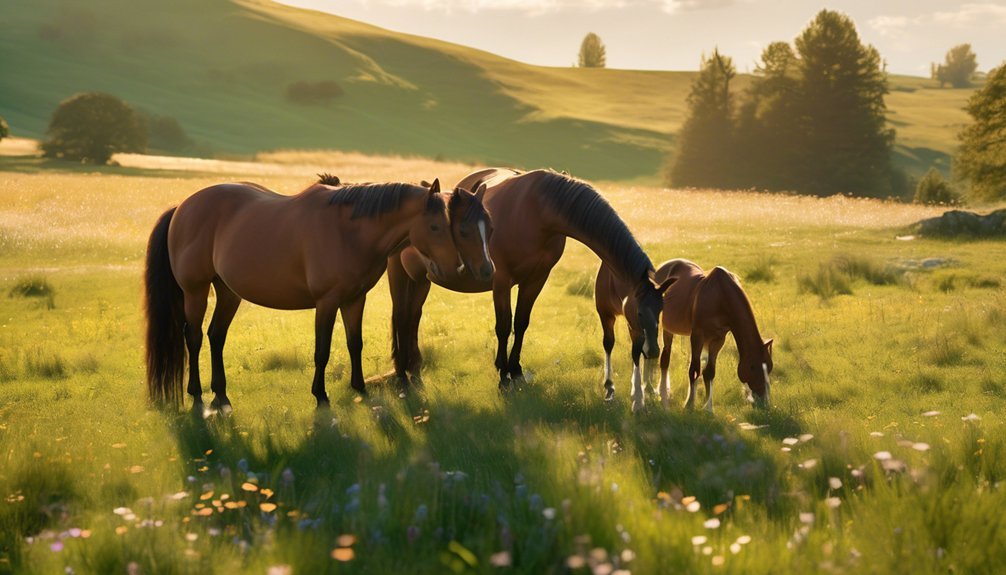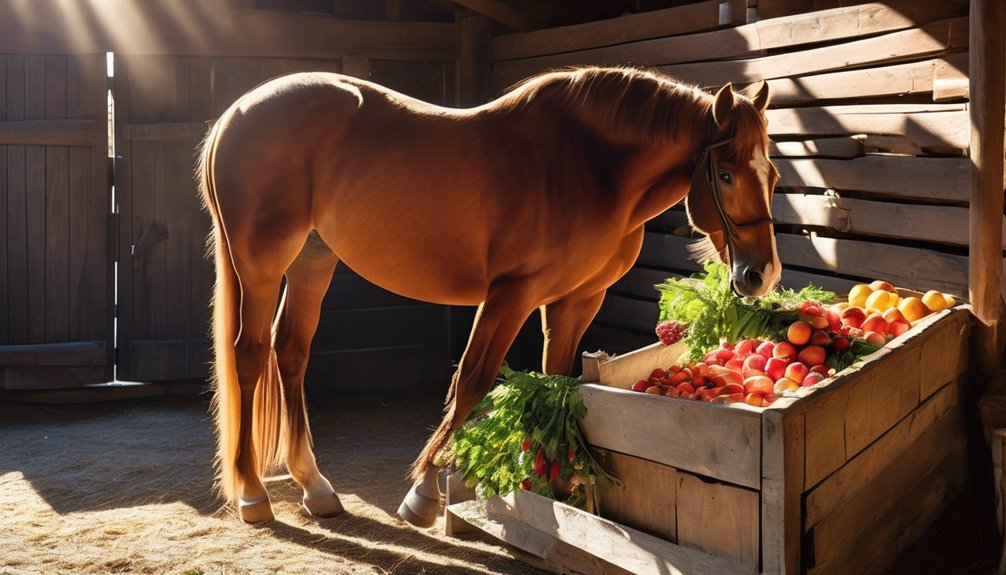
Feeding a picky eater horse can feel like trying to coax a cat into a bath. It's frustrating, but understanding the reasons behind their selective behavior is crucial for finding the right solution. Your horse's diet might need a thorough assessment, and experimenting with different feeds could be necessary. As you explore these options, consider how to create a consistent feeding environment that encourages your horse to eat. What strategies will work best for your unique situation?
Key Takeaways
- Conduct a thorough analysis of the horse's current diet to identify nutritional gaps and preferences.
- Introduce a variety of feed types and textures to find what the horse enjoys most.
- Incorporate flavor enhancers like apple or molasses to improve feed palatability.
- Establish a consistent feeding schedule to create predictability and reduce anxiety around mealtime.
- Monitor the horse's environment for stressors that may affect appetite and eating habits.
Understanding the Reasons Behind Picky Eating
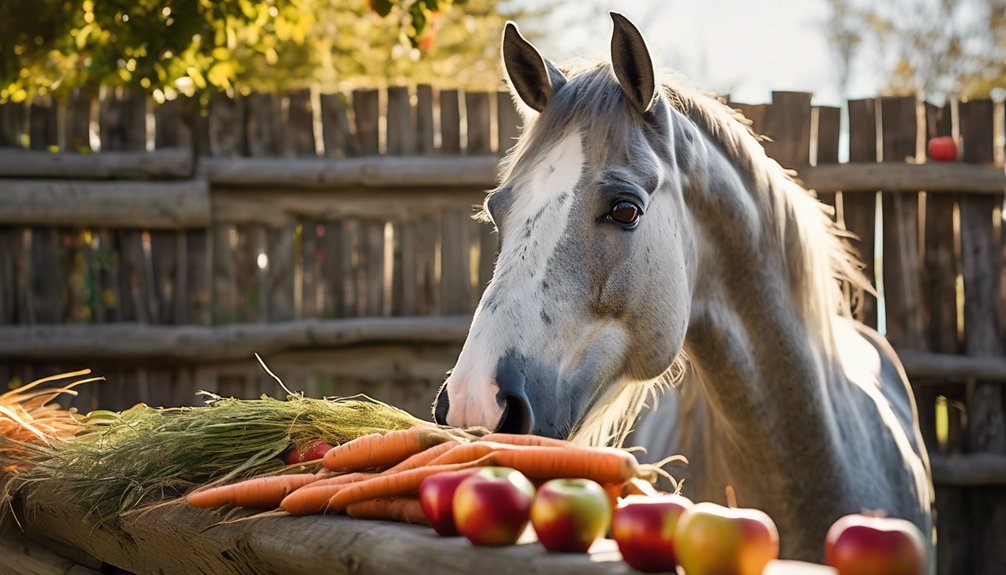
While it might seem frustrating when your horse turns its nose up at food, understanding the reasons behind picky eating can help you address the issue effectively.
Often, behavioral triggers such as stress, changes in routine, or even environmental factors can cause your horse to reject meals. Pay attention to their surroundings; a new stablemate or loud noises might be affecting their appetite.
Additionally, nutritional deficiencies can play a significant role. If your horse isn't receiving the right balance of vitamins and minerals, they may become selective about their food.
Assessing Your Horse's Current Diet
To effectively address picky eating in your horse, start by assessing their current diet. Conduct a thorough diet analysis to identify not just what your horse eats, but also how much and how frequently.
Look for gaps in nutritional balance; a diet lacking essential vitamins or minerals can lead to finicky behavior. Pay attention to the types of hay, grains, and supplements you provide. Are they fresh and free from mold?
Take note of your horse's preferences and dislikes, as these insights will guide adjustments. By understanding their current nutritional intake, you can make informed decisions to enhance their diet, ultimately encouraging better eating habits and overall health.
Experimenting With Different Feed Types

Experimenting with different feed types can be a game changer for picky eaters. By introducing a variety of feed options, you can discover your horse's texture preferences and enhance their overall eating experience. Start by observing which textures they tend to enjoy more—crunchy, chewy, or soft.
Here's a simple guide to help you explore feed variety:
| Feed Type | Texture | Notes |
|---|---|---|
| Pellets | Crunchy | High in nutrients, easy to store |
| Cubes | Chewy | Good for slow eating |
| Flakes | Soft | Mimics natural forage |
| Grain Mix | Crunchy/Soft | Versatile, adds flavor |
| Beet Pulp | Soft | Great for hydration |
Keep experimenting until you find the perfect combination!
Incorporating Flavor Enhancers
Adding flavor enhancers can significantly improve a picky eater horse's willingness to try new feeds. By incorporating flavor boosters like apple, carrot, or molasses, you can increase feed palatability and entice your horse to explore different options.
Experiment with small amounts at first, observing how your horse reacts to each addition. If they seem more interested, gradually increase the quantity. You might also consider mixing in some soaked hay cubes or a sprinkle of salt to make the feed more appealing.
Ensuring Proper Feed Storage

While you focus on enhancing your picky eater horse's diet, don't overlook the importance of proper feed storage. Keeping your feed in a clean, dry, and cool environment is essential to prevent spoilage.
Use airtight containers to minimize exposure to moisture and pests, which can lead to feed contamination. Remember, moldy or contaminated feed can deter even the most adventurous eaters.
Regularly check your feed for signs of spoilage or infestation, and rotate your supplies to ensure freshness. By prioritizing proper storage, you not only protect your horse's health but also enhance their willingness to eat.
A well-stored feed can make all the difference in your horse's overall enjoyment of their meals.
Maintaining a Consistent Feeding Schedule
Proper feed storage sets the stage for a successful feeding routine, but maintaining a consistent feeding schedule is just as vital for a picky eater horse.
Horses thrive on consistent routines, and regular feeding times help establish trust and comfort. By feeding your horse at the same times each day, you create a sense of predictability that can ease anxiety and encourage them to eat more willingly.
Consider setting reminders or using a feeding chart to stay on track. If you must adjust feeding times, do so gradually, allowing your horse to adapt without stress.
Your commitment to a consistent schedule not only supports their dietary needs but also strengthens your bond, reassuring your horse that mealtime is a reliable part of their day.
Gradually Transitioning to New Feeds
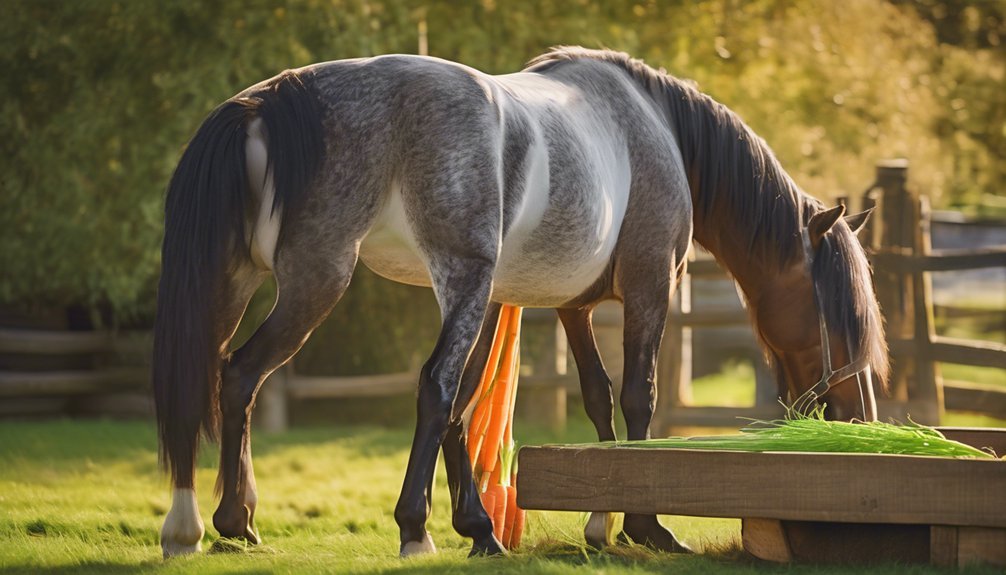
Transitioning to new feeds can be a delicate process, especially for picky eater horses. A gradual introduction is key to ensuring your horse accepts feed variety without stress.
Start by mixing a small amount of the new feed with their favorite. Monitor their reactions closely and adjust the mix as needed.
Here are some practical steps to follow:
- Introduce new feed slowly, over several days
- Use a 75/25 ratio of old to new feed initially
- Gradually increase the new feed percentage
- Observe your horse's preferences and adjust accordingly
- Be patient; some horses take longer to adapt
Seeking Professional Guidance
If you find yourself struggling to manage your picky eater horse's diet, seeking professional guidance can be a game changer. Consulting with professional nutritionists allows you to tailor your horse's meals to meet its unique needs.
They can analyze your horse's current diet, identify deficiencies, and suggest palatable alternatives that encourage healthy eating habits. Additionally, veterinary advice is invaluable. A vet can help rule out any underlying health issues that might be affecting your horse's appetite.
Together, these professionals can provide a comprehensive plan that addresses both nutrition and health, ensuring your horse receives the best care possible.
Monitoring Health and Behavior Changes
While introducing new foods or changes to your picky eater horse's diet, it's crucial to monitor any health and behavior changes closely. Keeping a vigilant eye on their well-being can help you catch any issues early.
Here are some key areas for health observations and behavior tracking:
- Eating habits: Note any reluctance or sudden changes in appetite.
- Weight fluctuations: Regularly check for unexpected weight loss or gain.
- Energy levels: Observe if they seem lethargic or more energetic than usual.
- Coat condition: A dull or unkempt coat can indicate nutritional deficiencies.
- Behavioral shifts: Watch for signs of stress, anxiety, or irritability.
Frequently Asked Questions
Can Environmental Factors Influence My Horse's Eating Habits?
Absolutely, environmental factors can significantly impact your horse's eating habits. By incorporating environmental enrichment and maintaining a consistent feeding routine, you can create a more inviting atmosphere that encourages your horse to eat more willingly.
What Are Signs of a Horse Being Truly Picky Versus Having Health Issues?
You'll notice behavioral signs like selective nibbling or refusal to eat certain feeds. If dietary changes don't help, it might signal health issues, so keep an eye on your horse's overall behavior and condition.
How Can I Tell if My Horse Is Bored With Its Feed?
If your horse snubs its meals, it might've turned into a gourmet connoisseur! To spark interest, experiment with feed variety and sensory enrichment; fresh flavors and textures can reignite their appetite and enthusiasm for eating.
Are There Specific Feeds for Senior Picky Eaters?
Yes, there are specific feeds designed for senior picky eaters. Focus on senior nutrition with palatable options that cater to their feed preferences. Experimenting with various textures and flavors can help make mealtime enjoyable for your horse.
How Can I Introduce New Feeds Without Stress for My Horse?
Introducing new feeds can feel like a delicate dance. For a smooth transition, gradually introduce the new feed, mixing it with the old. Your horse's comfort will blossom, easing stress and fostering trust in the process.
Conclusion
In conclusion, feeding a picky eater horse can feel like trying to solve a puzzle with a thousand pieces, but with patience and the right approach, you'll find the perfect fit. By understanding your horse's needs, experimenting with different feeds, and maintaining a consistent routine, you can create a more enjoyable mealtime experience. Keep monitoring their health and happiness, and don't hesitate to seek professional advice if needed. Happy feeding!



